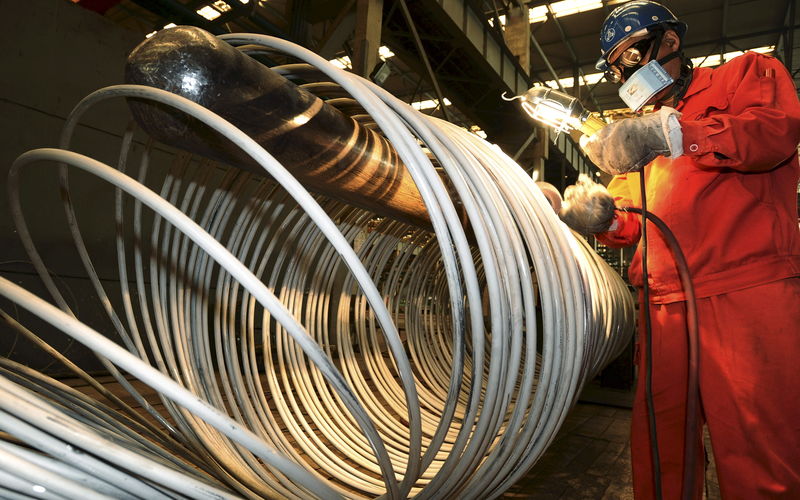By Maytaal Angel
LONDON (Reuters) - The European Union's anti-fraud office (OLAF) said it has found Chinese steel was shipped through Vietnam to evade the bloc's tariffs.
Steelmakers are now awaiting a similar but more widespread U.S. circumvention investigation involving China and Vietnam.
Trade tensions between Beijing and Western nations continue to simmer, with the United States taking a tough line even though China, producer of half the world's steel, has cut excess capacity by a quarter and reined in its exports of the alloy.
OLAF told Reuters roughly 8.2 million euros (£7.3 million) of anti-dumping duties were evaded when organic coated steel from China was shipped through Vietnam and given Vietnamese certificates of origin.
The amount involved is small and the case was concluded at the end of 2016, but market participants say Vietnam remains a hub not for fraud, but for Chinese trade tariff circumvention involving large tonnages of steel.
Financial recommendations were sent to the customs authorities of Belgium, Greece, Slovenia, Italy, Poland, Portugal, Lithuania, Romania and Sweden for the recovery of roughly 8.2 million euros of antidumping and countervailing duties.
Western steelmakers are hoping the EU will launch a similar circumvention case to the one pending in the United States.
A European Commission source said there was no ongoing investigation into that matter, but authorities would not hesitate to initiate a probe if they were made aware of circumvention allegations.
"If the EU ultimately applied duties currently levied against Chinese steel to imports from Vietnam, it would help close another loophole for Asian steelmakers to access the euro market," Jefferies analyst Seth Rosenfeld said.
The United States is due to rule shortly on whether Chinese steelmakers subject to U.S. duties diverted their shipments to Vietnam for minor processing into cold-rolled and corrosion-resistant steel, before selling them on to the United States.
By some estimates, up to 90 percent of the value of the Vietnamese steel shipped to the United States was produced in China.
The United States is also investigating a similar case involving 1 million tonnes of Chinese aluminium shipped to Vietnam and then on to Mexico allegedly to evade U.S. duties. China produces half the world's aluminium.
"The OLAF case will definitely raise, if not confirm, suspicions for (the U.S.) Commerce (Department). Also it would not be a surprise if there is an EU complaint already filed on circumvention via Vietnam," said Laurent Ruessmann, a partner at lawyers FieldFisher.
European steel lobby Eurofer, which usually launches such complaints, declined to comment. Authorities in Vietnam did not respond to requests for comment while China’s Commerce Ministry said it had not been informed of the U.S. or OLAF case.
After duties were imposed in 2016, U.S. imports of cold-rolled and corrosion-resistant steel from China almost ceased, falling to just over 45,000 tonnes from 1.2 million in 2015, according to the International Steel Statistics Bureau (ISSB).
Over the same period, U.S. imports of the two products from Vietnam surged ten-fold to nearly 700,000 tonnes.
U.S. cold rolled and corrosion resistant steel imports - http://reut.rs/2zWSwrY
In the EU, Chinese imports of corrosion-resistant steel, which nearly doubled last year, steadied in the year to August just as imports from Vietnam surged from historically negligible levels.
The EU imposed provisional duties on Chinese corrosion-resistant steel in August this year.
Vietnam, the world's sixth-largest steel importer, has slapped a variety of duties on Chinese steel in recent years, as it ramps up efforts to build a local steel industry and tackle its steel trade deficit with China.
Steelmaking capacity in Vietnam nearly doubled last year to 21.15 million tonnes, according to the Organisation for Economic Cooperation and Development. That nearly matched demand, which the Vietnamese Steel Association estimates at 22.3 million tonnes.
China accounts for some 60 percent of Vietnam's steel exports and more than a fifth of global steel exports, but with a persistent glut in steel, as well as in aluminium, there is little need for what Western producers say are subsidised Chinese exports of the metal.
"Another fast-developing steel market investing in internal capacity and erecting trade barriers cannot be a long-term benefit for the global industry," the ISSB said in a note on Vietnam.
The EU is the world's largest steel importer, followed by the United States.
